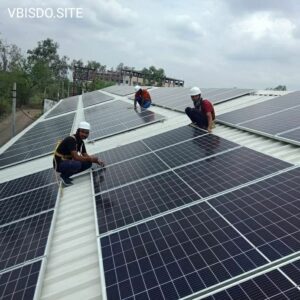As solar energy becomes increasingly popular, more people are thinking about making the change-over. One often asked issue, nevertheless, is how household solar panels operate. Knowing the physics and parts of a solar power system will enable you to make a wise choice and value the creativity driving your house from the sun.
This 2025 guide explains down how solar panels operate, what components comprise a household solar system, how energy moves through the system, and why solar energy is a game-changer for your house and the globe.
Describe a Home Solar Panel System
Usually referred to as a residential photovoltaic or PV system, a home solar panel system gathers solar energy and turns it into electricity to run your household appliances and equipment. The system consists of various parts that cooperate to convert, control, and provide useable electricity.
The Science: How Does Solar Panel Generation of Electricity Work?
Discovered in the 19th century, the photovoltaic (PV) effect is fundamental in the system and a scientific concept. This is how it operates:
-
Usually formed from silicon, solar cells are arranged into panels.
-
Sunlight strikes the panels, photons—light particles—knock electrons free from the silicon’s atoms.
-
Direct current (DC) electricity is produced in this electron movement.
-
The gadgets in your house may then run on alternating current (AC), which an inverter turns from DC power.
Simply said: sunshine → electricity → power for your house.
Home Solar Panel System Components
Knowing the main components of the system will help you to grasp the operation of home solar panels:
1. Pansels Solar
These are the obviously placed panels on your roof. Multiple solar cells on every panel gather sunlight and produce DC power.
2. Inverter
The systems’ brain is the inverter. It converts the DC power coming from the panels into AC power. Three basic types of inverters exist:
-
One for the whole system, string inverters
-
One microinver each for every panel.
-
Can combine battery storage, hybrid inverters
3. Mounting Strategy
Angled for best sun exposure, this structure firmly fastens the solar panels to your ground or roof.
4. Breaker Box, or Electrical Panel
Once turned to AC, the energy runs into the breaker box in your house and runs everything from refrigerators to lights.
5. Net Meter, also known as Smart Meter
This gadget compares your power use to what your panels produce. Should your system generate more than you use, the extra is returned to the grid.
6. Optional Battery Storage
Certain systems use solar batteries to save excess energy for use during blackouts or nighttime.
The Methodical Approach: Understanding Home Solar Panel Operation
Let’s stroll through a bright day’s events:
-
As sunlight strikes the solar panels, the PV cells come alive.
-
The cells generates DC power.
-
The inverter generates AC power from DC.
-
Your appliances are run by electricity entering the circuit panel in your house.
-
More power you generate than you consume either stores in a battery or flows to the utility system.
-
Your house could run from the grid or your battery system at night or on overcast days.
Grid-Tied Against Off-Grid Systems
Two major techniques are possible to arrange home solar systems:
1. Grid-Tied System
-
Keep your link to the energy grid.
-
Let net metering (you receive credit for extra energy sent back) run through.
-
Not calling for batteries.
-
Most often used and reasonably priced
2. Off-Grid Systems
-
Totally separate from the utility grid
-
Demand batteries.
-
Applied far out in distant areas
-
More costly but sustainable for me personally
Net Metering: Financial Saving with Solar Energy
Selling extra energy your solar panels create back to the utility company is made possible via net metering. It works like this:
-
Your system could generate more than your house need throughout the day.
-
The extra finds their way to the grid.
-
On overcast days or at night, you take power from the grid.
-
Your smart meter computes the net difference, and you get a credit or lowered charge.
One of the biggest financial inducements for homeowners choosing solar is this.
What Happens Tonight or on a Rainy Day?
Solar panels depend on sunshine, hence their performance is lowered on dark or rainy days as well as at night. But your house does not darken.
-
When called upon, grid-tied systems automatically turn to draw from the grid.
-
Batteries in systems allow stored energy to maintain operation of various objects.
-
There is no difference as modern solar systems are designed for perfect energy transfer.
By 2025, How Well Will Home Solar Panels Perform?
The typical solar panel in 2025 will convert between 18% and 22% of the sunshine into useable power. Thanks to advancements like these, premium versions might surpass 23% efficiency:
-
Silicon cells with monocrystallinity
-
PERC, or passivated emitter rear cell, technology
-
Bifacial solar panels
Less panels are required to produce the same quantity of power if more efficiency guarantees.
Advantages of Household Solar Panels
Knowing the operation of solar panels allows one to appreciate the many benefits of moving to solar:
✔ Reduced Power Costs
You create your own power, therefore dramatically reducing monthly utilities.
✅ Environmentally Friendly
Renewable and clean, solar energy lowers your carbon impact.
✅ Higher Property Value
Studies reveal houses with solar panels sell quicker and for greater value.
✅ Independence of Energy
You can maintain electricity during outages (with batteries) and you rely less on erratic utility rates.
✅ Long-Term Dedication
Usually with a 25-30 year guarantee, most panels provide decades of performance.
Variables Influencing Solar Panel Performance
No residence receives the same sun output. Performance is based on:
-
Roof angle and orientation; optimal in the Northern Hemisphere is south-facing.
-
Location and climate
-
Shadow created by buildings or trees.
-
Type of panel and system scale
-
Maintenance and purity
Is Solar Right for Your Residential Property?
If you’re considering installing solar, ask yourself:
-
Does your roof lie in direct sunlight?
-
Do your power bills seem excessive?
-
Are solar subsidies or net metering present in your neighbourhood?
-
Long term, are you remaining in your house?
If you answered yes to most of them, your home probably would be wise to make a solar investment in.
Final Notes: Why Knowledge of Solar Technology Matters
Understanding the operation of home solar panels helps you to make wise financial choices for your house as well as environmentally responsible ones. For decades you will enjoy reduced expenses, clean energy, and peace of mind with the correct system.
Solar energy is more than just a fad whether you go grid-tied or off-grid; add battery storage or keep it basic. This is a long-term fix for a reasonably priced, sustainable future.
About Ready to Switch to Solar?
Ask a qualified solar installer in your neighbourhood for a home evaluation, then find out how much you may save by running your house solar-powered.

